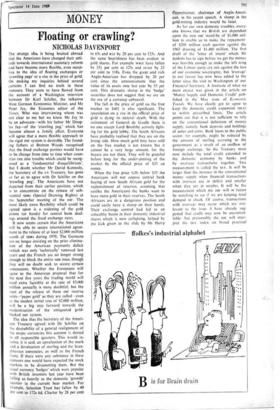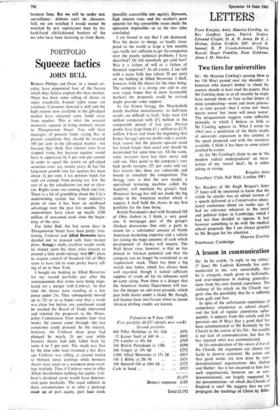Floating or crawling? MONEY
NICHOLAS DAVENPORT
The strange idea is being bruited abroad that the Americans have changed their atti- tude towards international monetary reform and have become more flexible, even recep- tive to the idea of floating exchanges or 'crawling pegs' or a rise in the price of gold. On making my inquiries behind several curtains I can find no truth in these rumours. They seem to have flowed from the account of a Washington interview between Dr Karl Schiller, the talkative West German Economics Minister, and Mr Peter Jay, the Ecnomics editor of the Times. Who was interviewing whom was not clear to me but we know Mr Jay to be an advocate—with his father Mr Doug- las Jay—of the 'crawling peg,' which has become almost a family affair. Everyone will agree that a more flexible approach to the rigid IMF system is desirable. The found- ing fathers at Bretton Woods recognised that the fixed exchange parities would have to be change from time to time when coun- tries ran into trouble which could be recog- nised as a 'fundamental disequilibrium'. But I doubt whether Mr David Kennedy, the Secretary of the us Treasury, has gone so far as to agree with Dr Schiller on the 'crawling peg'. The Americans have not departed from their earlier position, which is to concentrate on the release of sub- stantial SDRS (Special Drawing Rights) at the September meeting of the IMF. The most likely extra flexibility which could be agreed upon is a widening of the gold points (or bands) for central bank deal- ings around the fixed exchange rates.
It now seems certain that the Americans will be able to secure international agree- ment to the release of at least $2,000 million worth of SDRS during 1970. The Germans are no longer insisting on the prior elimina- tion of the American payments deficit (which was only 'technically' removed last year) and the French are no longer strong enough to block the entire SDR issue, though they will no doubt seek to secure certain concessions. Whether the Europeans will agree to the American proposal that for the next five years the trading world will need extra liquidity at the rate of $5,000 million annually is more doubtful, but the start of the release of these 114F reserve units—`paper gold' as they are called—even at the modest initial rate of $2,000 million, will be a big step forward towards the modernisation of the antiquated gold- backed IMF System.
The idea that the Secretary of the Ameri- can Treasury agreed with Dr Schiller on the desirability of a general realignment of the major currencies this autumn is denied in all responsible quarters. This would in- volve, it is said, an upvaluation of the mark and a devaluation of sterling and the Scan- dinavian currencies, as well as the French franc. If there were any substance in these rumours one would have expected the stock markets to be discounting them. But the usual currency 'hedges' which were popular with British investors last year have been falling as heavily as the domestic 'growth' equities in the current bear market. For example, Selection Trust has fallen by 40 Per cent to 172s 6d, Charter by 28 per cent to 65s and RTZ by 20 per cent to 125s. And the same bearishness has been evident in gold shares. For example WRIT have fallen by 33f per cent to 125s and oesrr by 25 per cent to 118s. Even the great and rich Anglo-American has dropped by 20 per cent since the announcement that the value of its assets rose last year by 55 per cent. This dramatic slump in the 'hedge' securities does not suggest that we are on the eve of a currency upheaval.
The fall in the price of gold on the free market to $401 is also significant. The speculation on a rise in the official price of gold is dying its natural death. With the retirement of General de Gaulle there is no one except Lord Boothby actively fight- ing for the gold lobby. The South Africans have probably realised that they are on the losing side. How much gold they have sold on the free market is not known but it cannot be a very large amount, for the buyers are not there. They will be grateful before long for the under-pinning of the market by the official price of $35 an ounce.
When the free price falls below $35 the Americans will not oppose central bank buying of new South African gold for the replenishment of reserves, assuming that (unlike the Americans) the banks want to have more gold in their reserves. The South Africans are in a dangerous position and could easily have a slump on their hands. Their exchange control had led to an unhealthy boom in their domestic industrial shares which is now collapsing, helped by the kick given to the slide by Mr Harry Oppenheimer, chairman of Anglo-Ameri- can, in his recent speech. A slump in the gold-mining industry would be fatal.
As for our own domestic troubles, every- one knows that we British are dependent _upon the new IMF stand-by of $1.000 mil- lion to enable us to make the repayment. of $200 million each quarter against the 1965 drawing of $1,400 million. The first draft of the 'letter of intent' which Mr Jenkins has to sign before we get the money was horrible enough to make the left wing of the Labour party cry out against the loss of our economic sovereignty, but 'leverage' in our favour has now been added to the letter since the visit to Washington of our Financial Secretary. A foretaste of what we must expect was given in the article on 'Money Supply and Domestic Credit' pub- lished in the May issue of Economic Trends. We have clearly got to agree to keep the domestic credit expansion (DcE) to within prescribed limits. The article points out that it is not sufficient to rely on the conventional definition of money supply, namely, bank deposits and holdings of notes and coins. Bank loans to the public sector, for example, might be reduced by the amount of sterling accruing to the government as a result of an outflow of foreign exchange. So the Treasury must now include the total credit extended to the domestic economy by banks and by overseas transactions together. This measurement is called the DCE. It will be larger than the increase in the conventional money supply when financial transactions with overseas are in deficit and smaller when they are in surplus. It will be the measurement which the IMF will in future be watching to see if we are keeping total demand in check. Of course, transactions with overseas may occur which are irre- levant to the issue-1 have already sug- gested that credit may now be uncontrol- lable– but presumably the IMF will inter- pret the DCE index on broad practical business lines. But we will be under DCE surveillance: debtors can't be choosers. Still, we are watched I would sooner be watched by DCE statisticians than by the hard-faced old-fashioned bankers of the BIS who have been lecturing us from Basle.



































 Previous page
Previous page